- Learning time
- 60 minutes
- First play time
- 180 minutes
Historia
Designed by: Marco Pranza
In Historia players are competing civilisations over history, but whereas many ‘civ’ games stretch over four, six, eight or more hours, Historia attempts it in two.
Each player takes possession of a civilisation – at the start of the game, that’s a solitary action cube on the map (representing your people) and a marker on the matrix – the main part of the board that tracks your civilisations’ developing technology and military might. Players also have a set of matching cards each, plus one or two special ones that are distinct to their civilisation, and two more action cubes at their disposal
Play is deceptively simple – everyone chooses a card to activate, and all are simultaneously revealed before being played in turn order. The cards do a variety of things, most crucial perhaps the advancing of your tech (moving right) or your military (moving up) across the matrix: the stronger you are militarily, the more you can mess with opponents on the map, and the more highly developed your tech is, the more advantages and bonuses you get in the game.
Other actions are available as well though; attacking or raiding opponents, building wonders – which bring their own rewards – but the catch with many of these cards is that they cost you your precious action cubes; when you run out, there’s not much you can do but play your exploit the people card in order to get some back. But, as you’ll see, certain cards, wonders or spots on the matrix trigger their return too, so it’s possible to avoid this ‘wasted turn’ with some canny play.
Once played, are card is temporarily unavailable to you until someone plays a Revolution card. At that point all players will have some cards returned to them – not all! – and there may be some scoring, depending on what turn has just finished – a round tracker on the board guides you through the bookkeeping at the end of each turn, and after four turns a new age begins. After the fourth age and final scoring, the player with the most points wins!
Note too that Historia comes with a ‘civbot’ option – an automated system that allows low (or single) player counts to add a bit more tactical drama to the game. It’s recommended by the game (and us) that you always include them – and they’re very easy to run, consisting of a small deck of cards. It’s also possible to add in the Events deck too; a card drawn each round that defines something particular to this turn – a bonus, or possible penalty, for a certain action on the current turn.
The guru's verdict
-
Take That!
Take That!
Not an out-and-out battle, but not a stroll in the park either. There's no player elimination here and you can win whilst being the least military-minded player. But having some strength is usually a good idea, as a stronger presence on the map results in more points.
-
Fidget Factor!
Fidget Factor!
Potentially high, certainly on those first couple of plays. Then it starts to speed up, but for every few turns that rattle by at speed, there'll probably be the odd one that has at least one player scratching their heads over their best move.
-
Brain Burn!
Brain Burn!
There's a lot to juggle - your position on the map, your route on the matrix, which card to play and the ramifications of each. And on top of that - who is going to play what? When a Revolution is played is key, and who plays it can be important too. joy for some; a nightmare for others.
-
Again Again!
Again Again!
There's a fair bit of depth to Historia - not only can you play the different civilisations with their different cards, you can try different strategies across the matrix too.

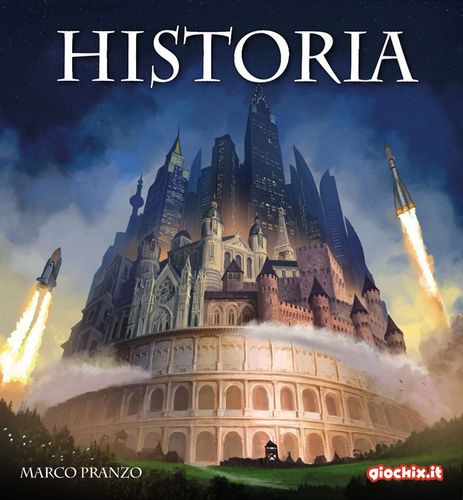
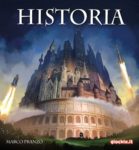
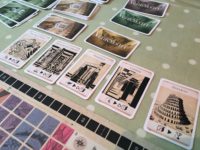
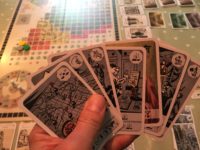
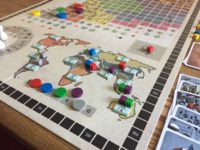
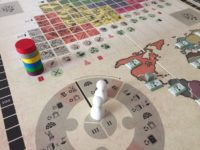
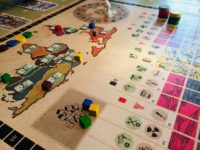


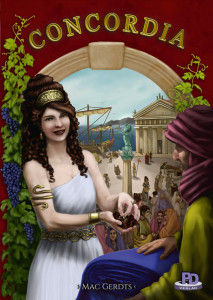
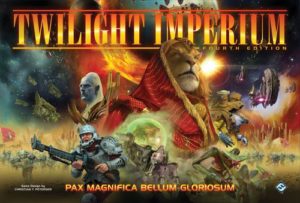
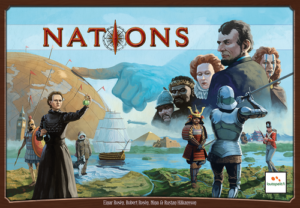
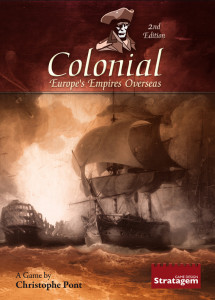
Sam says
The card-playing in Historia reminded me of another game I've enjoyed a lot - Concordia has a similar thing going on, where you find yourself wanting the cards you've played back in your hand, and the dilemma is whether you get them back or keep going with other plans. I love that agonising, and when you combine it with the second-guessing of what your opponents are playing, there's some really interesting stuff going on. The board might resemble a spreadsheet, but I like the presentation here too - watching as the civilisations travel across the matrix, from fire to the internet and beyond... and if the order of events (WWII arrives before Vesuvius erupting!) and advisers can feel incongruous (Elvis Presley? Bruce Lee?) I feel the actual game play more than makes up for it. That said, the board is very abstract compared to other civilisation games where there's more physical or geographic representation of how well you're doing - games such as Twilight Imperium. But those games demand far more time, and if you want something epic that - assuming you don't start too late! - doesn't take you into the wee hours, Historia could be a very good fit.